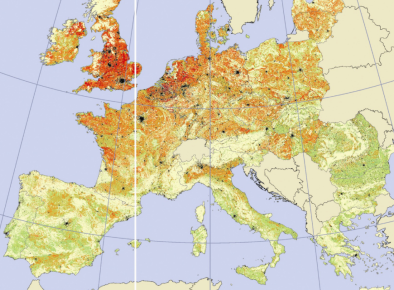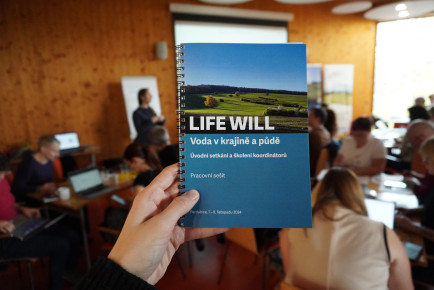Climate-active people need to know what the non-profit sector can offer—Green Dock
Published: Oct 9, 2023 Reading time: 10 minutes Share: Share an articleFour-fifths of Czechs aged 15-20 consider climate change a serious problem. They are the most motivated age group to get involved in climate protection. But something is stopping them. Researcher Ondřej Kácha and his colleagues from Green Dock have identified these barriers and described other findings. For example, Ondřej points out that even an active senior can be an enthusiastic volunteer, but first, they need reliable information.

Last year, the non-profit organisation Green Dock provided funding that allowed us to conduct research on engaging young people in addressing climate change. The research explored the barriers and opportunities for NGOs, schools, and local governments to engage young people in addressing climate change. It also suggested recommendations on how best to do this. Ondřej Kácha, Bronislav Farkač, and Adéla Becková (Green Dock) contributed to the research.
Simplify!
In the report, the researchers describe five stages of a typical young person's journey to engage in climate action. These steps run from initial sympathy to becoming comfortable with an initiative or finding their path. The whole journey can be thought of as a 'funnel'. The funnel is widest initially and gradually narrows as the person progresses. Most people stop at building the first sympathy for climate protection. They tell themselves that it is important to address the issue. However, their behaviour does not move beyond the personal level of small activities such as sorting waste or reducing car journeys.
The second phase requires people to actively seek out and learn about various environmental initiatives. This phase represents a significant step in difficulty because people must process more information. Finding out what can be done for the environment is relatively easy. The consensus is to fly less and eat less meat. But when you look for a project to get involved in, you find that the reality is entirely different.
"On the one hand, in the Czech Republic, we are lucky that there are many environmental projects," says Ondřej Kácha, describing the problem of the Czech non-profit environment. "On the other hand, the number discourages many young people. Each environmental initiative presents itself in its own way and through its own communication channels. This is daunting for a person just starting to get interested in the topic," he adds.
According to the researchers, simplifying is one of the most important ways to get to the second phase. Environmental organisations or projects should communicate transparently what involvement would entail and how time-consuming it would be. They should present the work through other young people who should be the leading messengers. For example, several environmental organisations may agree to organise a virtual event where their representatives present their work within a set time. People would not have to visit one website after another and try to piece things together themselves.
Schools: Agents of positive change
Another option, according to Ondřej, is schools. These are a natural choice as young people attend anyway. For example, a compulsory class could include a lesson in which several environmental projects would be presented. Students could choose from these and carry out their environmental activities.
The researchers also encountered cases where activity in an environmental initiative counted towards a student's grades. Similarly, some employers allow their employees to spend one day a month or one week a year volunteering, for example. There are such schools and employers in the Czech Republic, but they are few. At present, the number of teachers who support their pupils in activities on an individual basis is far more prevalent.
Discrimination, radicalism, and non-hierarchy
Active young people often have to deal with negative labels and, unfortunately, rarely have support from their parents or other circles of friends. They are more likely to find it in similarly active people. Unfortunately, Green Dock researchers have heard from some active volunteers that they face the problem of age discrimination even within their volunteer initiatives. Given its parameters, the research noted the ageism of adult members of the initiatives towards younger ones. But, according to Ondřej, intergenerational differences are one of the significant issues it tends to spark.
"People are inherently prone to prejudices and stereotyping others," Ondřej points out. "Unfortunately, this is also true in environmental initiatives. Every environmental project and organisation to have control mechanisms built into their operations that help prevent ageism and other forms of discrimination," he adds.
In addition, younger people are more likely to be involved in movements and initiatives that are more radical and disrupt the social order. Naturally, people who are satisfied with the social order resist disruptors and create additional stereotypes against them, making cooperation difficult.
It can also happen that a radical young person comes into an organisation with a long-established structure, hierarchy, or value system and tries to adapt its operations to their own vision and values. According to Ondřej, organisations are similar to the state in some ways. For example, they have a certain degree of regulation and control. The larger the organisation, the more challenging it is to change. In our country, the Fridays For Future movement is an exception, which operates non-hierarchically. If a member brings an idea and gets people together, it can be implemented.
Volunteering needs to be thought about, and experiences shared
It is common for young people to leave an initiative in which they have already established themselves after some time. Some decide to start their own projects after learning about how people work in the previous one. Others stop seeing the environmental impact of their activities or find them too small. Researchers have also found that young people left because an initiative demanded more time, involvement, or performance than they could give.
According to Ondřej Kácha, this happens because young volunteers often go into initiatives with an extra hour or two of their free time. However, leaders in such organisations are often perfectionists who don't find the work of volunteers sufficient and demand extra effort from them.
"I think it's really up to the environmental initiative to decide whether it wants to consist of a smaller number of highly invested individuals or whether it wants to bring together as many people as possible and not demand too much from them," Kácha says. If an initiative wants to go the latter route, he says, it should allow for youth involvement on several levels, which would vary in time and other requirements. Such a model is more applicable to larger, already established organisations with the capacity and financial means to have at least full-time leadership.
It can be assumed that if the organisation does not discourage volunteers with high demands right from the start, volunteers are more likely to stay and perhaps even extend their time with the organisation. Especially at the beginning, when the volunteer is getting to know the organisation, its priorities, values, and people, all this should be considered, and tolerance should be higher. According to Ondřej, this is essentially a trial period.
In addition, the researchers heard from more active volunteers in established organisations. When they wanted to start their own initiative, these volunteers said they suddenly encountered many tasks that they had not considered before, i.e., project management, marketing, finance, fundraising, running the association, etc. Ondřej Kácha sees room for more experienced organisations to pass on their knowledge.
Municipalities should know the benefits of energy savings and civic activism
The Green Dock researchers advised municipalities on setting the conditions for youth activities to address climate-related issues. But, they faced the question of how to motivate the municipalities themselves? Tackling climate issues sometimes brings immediate benefits for the municipality and its citizens. One example is the support of environmental associations that clean up litter in the local countryside. Many municipalities also motivate citizens and promote social life in their development strategy.
According to Ondřej Kácha, there is a great deal of development on the general level of environmental issues, especially in the energy field. Municipalities are dealing a lot with energy communities. For example, they are looking for ways to motivate their neighbours to get together and set up their community to generate their own electricity. Moreover, this is all being promoted by the European Union.
A critical summer and hope for systemic change
This summer has been extreme. It was dry and hot; the news was about fires in other European countries. Such news, of course, affects society's perception of climate change. People are more likely to say climate change is a severe problem in opinion polls conducted in the summer. They are more aware of it.
"I believe that even this bad will be good for something. Extreme phenomena can increase the saliency of a topic in society (its salience, level of importance, or conspicuousness); people talk about it more," says Ondřej with a dose of optimism. "The question for us psychologists is how to help those talking about it to translate their attitudes and intentions into reality," he adds.
Again, he said, one of the best ways to simplify activities for people is through environmental organisations and by simplifying information. Many people today still don't know the most effective actions they can take to reduce emissions. What is more complicated to explain to people is the need for systemic change. And they are also less able to do anything about it. Disaster salience can help here, too, says Ondřej. People can then tell themselves that eating less meat is not just worth it, but that they also need to change the system settings. And then they join more prominent groups. In psychological research, this general trend is traceable.
Activism for all generations
One can assume that seniors were probably considering environmental issues during this critical summer. The situation may be making them anxious, and at the same time, some may be growing motivated to get involved in solving the problem.
According to Ondřej Kácha, there are significant differences between individual seniors. Some spend most of their time at home, and it is challenging to communicate with them. Others are active and are members of various interest groups. Suppose an initiative is interested in activating these people. In that case, it might help to find communication channels or groups they are part of and in which trust already exists and introduce them to opportunities to get involved.
According to Kácha, the older generation should not be underestimated as potential participants in protests, events or happenings. Examples from abroad also show that representatives of the older classes often participate in Extinction Rebellion events, even though there are far fewer of them.
To involve older community members, events need to be rethought, adapted to them, and made more attractive0151 perhaps through the participation of people known to the older generations' representatives. "And if not, these people can stay on the level of more moderate civic activism by voting or writing letters to representatives. At the grassroots level, they can talk to their peers and try to influence them to not throw it to politicians who won't address these issues," Kácha says.
At the same time, he does not expect much of a fallback from the summer's determination to do something about climate change. Environmental issues may fall away in winter, but the energy crisis, whose solutions are tied to climate change, may return.
"Some experts predict that this winter will be even worse than the last one. There will be the issue of renewables again and how to make it more independent and self-sufficient. The question is which way the social debate will turn, whether we will take steps towards energy independence or moan about not having more oil and gas trade agreements. I hope that environmental issues will remain in society and will continue to be addressed," says Ondřej Kácha.
The original article in Ekolist.cz!


